






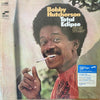
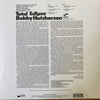
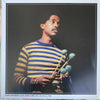
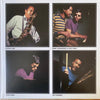
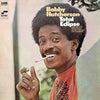
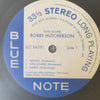
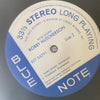
Bobby Hutcherson - Total Eclipse
Vibraphone - Bobby Hutcherson [click here to see more vinyl featuring Bobby Hutcherson]
Piano - Chick Corea [click here to see more vinyl featuring Chick Corea]
Flute, tenor sax - Harold Land
Drums - Joe Chambers
Bass - Reggie Johnson
Written by Bobby Hutcherson
1 LP, Gatefold jacket
Original analog Master tape : YES
Heavy Press : 180g
Record color : black
Speed : 33RPM
Size : 12”
Stereo
Studio
Record Press : Record Technology Incorporated
Label : Blue Note Tone Poet
Original Label : Blue Note
Recorded July 12, 1968 at Studio Plaza Sound Studios, New York City
Recorded by George Sawtelle
Original session produced by Duke Pearson, Francis Wolff
Reissue produced by Joe Harley
Mastered by Kevin Gray at Cohearent Audio
Design by Forlenza Venosa Associates
Liner Notes by Herb Wong
Photography by Fred Seligo
Originally released in February 1969
Reissued in February 2024
Tracks :
Side A:
- Herzog
- Total Eclipse
- Matrix
Side B:
- Same Shame
- Pompeian
Reviews :
"Total Eclipse was Bobby Hutcherson's first recording session with tenor saxophonist Harold Land, who became one of his major collaborators (and a quintet co-leader) during the late '60s. Land's rounded, echoing tone is a nice contrast for the coolly cerebral post-bop that fills Total Eclipse. Hutcherson contributes four of the five compositions (the other, "Matrix," is by pianist Chick Corea), and he's in a mood to intellectually challenge himself and the rest of the quintet, which also includes bassist Reggie Johnson and longtime drummer Joe Chambers. The results are full of the sort of skillful musicianship one would naturally expect of Hutcherson's '60s-era Blue Notes. Land's solo lines are fluid and lengthy, assimilating some of Coltrane's innovations while remaining accessibly soulful. Though they're all pretty strong, "Pompeian" is the most ambitious piece; it opens with a happy-go-lucky, waltz-time flute melody, and after a bit of foreboding, Hutcherson expands upon it with a tinkling bell solo. Toward the end of the piece, the whole group builds to a chaotic eruption, with Hutcherson switching to marimba (as he often did when he wanted a darker tone and high-tempo articulation); the pretty flute theme is then repeated as the dust settles and the piece ends. Overall, though, the album foreshadows Hutcherson's move away from his explicit avant-garde leanings and into a still-advanced but more structured modernist framework. For some reason, Total Eclipse was the only post-bop-styled album Hutcherson and Land recorded together that was released at the time; though they're all high-quality, this remains perhaps the best of the lot." AllMusic Review by Steve Huey
"A great contribution from Bobby’s new tenor collaboration, “The Fox”, Harold Land, and the fresh sound of Chick Corea, marks this album out from being “just another vibes outing”.
Land was a still-vigorous hard bop player who added some welcome heat to contrast with Hutcherson’s cool metallic ringing tones. Jazz writer John Fordham described Land’s tenor style as “somewhere between the muscularity and earthiness of pre-bebop blues and freewheeling swing, and the restraint and delicacy of the cool school of the mid-1950s” (Land’s obituary, 2001). Despite superficial comparisons with Coltrane, Land was very much his own voice, and his playing much admired “for its intelligence and poise“. The collaboration with Hutcherson was to span seven Blue Note releases between 1968 and 1975.
Chick Corea here was just beginning to establish himself, sitting in the piano seat shortly to be occupied by Stanley Cowell (Strata East!). Corea’s debut album,Tones for Joan’s Bones (Woody Shaw!) was recorded only two years previously, followed by a title released under Pete La Rocca’s name, Turkish Women at the Bath (later briefly reissued by Muse as Bliss under Corea’s name, until the lawyers settled in favour of La Rocca). Soon after, Chick’s electric piano arrived, and by 1972 Return To Forever had taken off. No synthesiser noodling here, but sympathetic comping and solo, cascading notes and flourishes on a broad canvas reminiscent of McCoy Tyner with shades of Andrew Hill.
The title track opens deceptively: languid, cool, and peaceful but quickly gives way to a fast-paced exhilarating ride, with first Land at the helm. Floating figures and flourishes embellish rapid-fire runs maintaining fast forward momentum. Hutcherson maintains the pace with serpentine vibraharp invention in more linear solo patterns, xylophone mode rather than sometime sonorous colourings. Corea generates a spacious ambience, lots of air, which set me determined to get out my other early Corea acoustic piano albums and on the turntable. (The RTF collection will have to stay in the loft!). Reggie Johnson on bass and Joe Chambers on drums make their own contribution, keep the ears alert, following everyone working together.
Each of the other tracks on Total Eclipse maintain interest, the jaunty romp Herzog, the more conceptual Pompeian, and one track attributed to Corea, suitably enigmatic title – Matrix. (L Ron Hubbard influence?) The album has a good amount of heart to it, and “not just another vibes outing”
Cover-lover’s Corner: what is it with that cheesy grin? The hat and beard was to come later, but Bobby’s transformation from “serious artist” to “cheeky boy-next-door” is complete. Clearly by 1968 “serious artists” were no longer a selling point." London Jazz Collector Review
Ratings:
AllMusic : 4 / 5 ; Discogs : 4.35 / 5 ; The Penguin Guide to Jazz : 3 / 4



